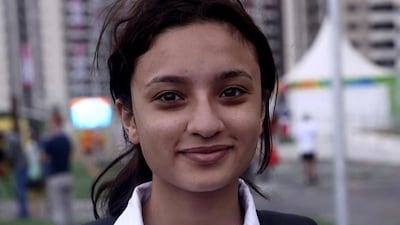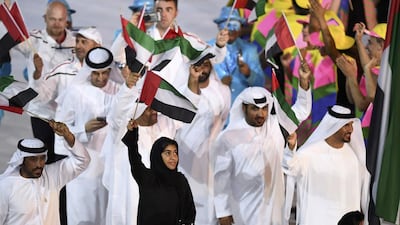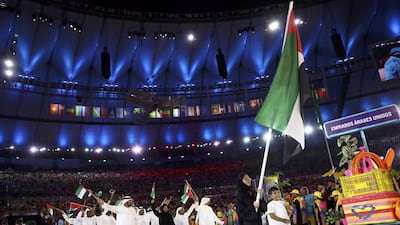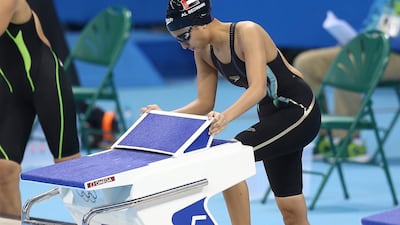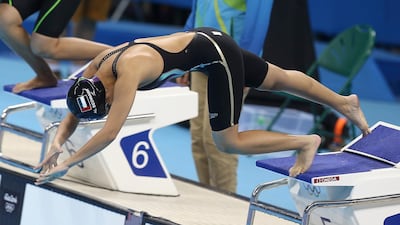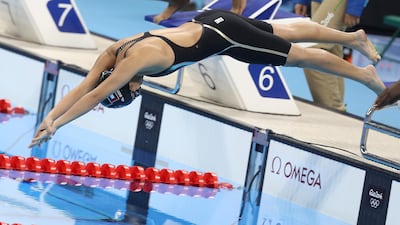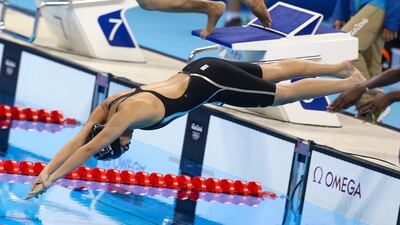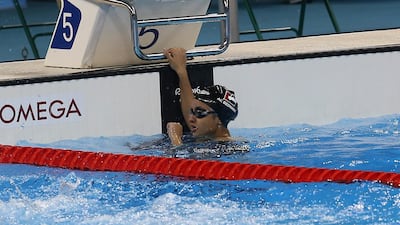Four years ago, Nada Al Bedwawi made history as the UAE’s first female swimmer to participate in an Olympic Games.
Barely 18 years old at the time, Al Bedwawi was given the honour of being the flag-bearer in the opening ceremony in Rio 2016, ushering a delegation of 13 Emirati athletes (nine men and four women) around the iconic Maracana Stadium.
It was a moment that symbolised how far the UAE had come in its efforts to promote women’s sport, but also a reminder of how much more can be done in order to send more than four women to a single Olympic Games.
Before she was selected to go to Rio and was given the wildcard awarded to the UAE in the 50m freestyle event, Al Bedwawi was targeting the Tokyo 2020 Olympics.
A late-starter, she had taken up swimming seriously at the age of 14, and wanted more time to be ready for the sport’s biggest stage. Yet when the opportunity presented itself, the then teenaged Al Bedwawi could not say no and competing in Brazil remains her proudest achievement to date.
"I became more seen, thanks to the Olympic Games," Al Bedwawi told The National. "My first swimming coach used to not let me come to training more than twice a week; he told me I should just do it for fitness, because I was starting out so late. So the Olympics definitely helped me get more seen.
“I was very proud of myself, so it really helped a lot with my self-esteem.”
Although 2020 was Al Bedwawi’s initial goal, her swimming career took a detour after Rio, and she stopped training. A psychology student at NYU Abu Dhabi at the time, she transferred to MBRU in 2018 to pursue a degree in medicine and found it hard to balance her studies and her sport.
Successful career
“Honestly I’m still mad at myself, still bummed that I didn’t continue practicing,” she admits.
Al Bedwawi acknowledges she didn’t do her part in terms of keeping at it post-Olympics, but her case also raises questions about the structure put in place to support athletes in their pursuit of a lengthy and successful career.
A former UAE national team swimming coach tells me the UAE Swimming Federation doesn’t have the budget to create a tailor-made technical programme that can build up a swimmer over an extended period of time.
While high-calibre coaches are brought in, and a robust calendar of swimming competitions take place domestically throughout the year, he says “the programme needs to be more professional in order to create Olympians. It needs to be a specific and intense programme in order to create champions.
“We need sponsors because the federation alone cannot fund the champions,” he added.
At first, Al Bedwawi thought she could manage her university workload alongside her swimming, but she quickly realised that wasn’t the case. She saw how US swimmers, like five-time Olympic gold medallist Katie Ledecky, attended tough schools like Stanford University, yet still found a way to excel in the sport.
“We’re still not there yet, where our schools help you study and train at the same time,” notes Al Bedwawi. “I’m not doing my part to be honest.
“I’m really hoping for the next Olympics, in 2024. All my friends are asking me, ‘Are we seeing you in Tokyo 2020?’ I felt really bad.
“I really want this for myself. I haven’t been feeling very good about myself and then I ask myself, ‘Why am I feeling this way?’ And I trace it back to the last time I actually felt good and proud of myself, and that was at the Olympics.”
Reviving the dream
Al Bedwawi wants to start training again soon, inspired by 28-time Olympic medallist Michael Phelps, whom she met at a store opening in Dubai in 2017.
“Honestly he’s my biggest inspiration because he was talking about the time he had a relapse and he had to go to rehab, and the drunk-driving incident and everything, and he was so open about it and I appreciate that so much.
"Very few people talk about things like that openly, especially about getting back in the game. So he inspired me to do that as well and [train for the 2024 Games],” she explains.
The UAE’s current national women’s team consists of five swimmers, all aged 15 and under. Recently recruited head coach and technical director Aly Diab says the federation is focusing on grass-root initiatives, while also bringing in the UAE’s veteran swimmers to benefit from their experience.
With the Tokyo 2020 Games postponed until next year due to the coronavirus pandemic, and all sporting activities currently put on hold, Diab created a WhatsApp group for the national team swimmers, where he shares some dry-land training plans for them to do at home.
Providing inspiration
Two swimmers, Yousuf Al Matrooshi, 17, and Layla Al Khatib, 13, are expected to represent the UAE via wildcards at the Tokyo Olympics next year, and the hope is that it proves to be the beginning, not the end, of a thriving career for both.
Whether Al Bedwawi makes it to the 2024 Games or not, she can still take great pride in knowing she was the first female swimmer from her country to compete at the Olympics.
There were barely any women on the UAE’s swim squad four years ago. Today there are five girls on the national team, and many more swimming for clubs around the Emirates, including Al Bedwawi’s 13-year-old sister Noura, whom Nada assures “is so much better than I am”.
That lap Nada took around the Maracana on August 5, 2016, carrying the UAE flag in front of millions of viewers worldwide, made certain she made an impact within her household and beyond. Here’s hoping many more young girls take the plunge and follow suit.
